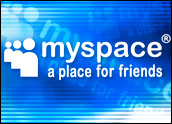
The world’s largest online social networking site, MySpace, is leaping into politics.
The site plans to host a virtual primary Jan. 1 and 2, 2008, in advance of traditional bellwether political events such as the Iowa caucuses and New Hampshire primary.
MySpace announced its intentions Tuesday, but the site is already heading in a political direction. The MySpace Impact Channel, launched last month, currently features presidential hopefuls Hillary Clinton, Rudy Giuliani, John McCain and Barack Obama, among others.
The virtual election will be open to all members of the MySpace community in the United States, and the site plans to encourage MySpace users 18 years of age or older to register to vote in their home-state elections through MySpace’s online voter registration tool, which is offered in partnership with Declare Yourself, an organization that encourages young people to vote.
“Iowa and New Hampshire may be selecting delegates, but the MySpace vote will be the first test of where candidates stand in the election year,” Tom Anderson, MySpace president, said.
Engaging the Community
“Good old fashioned politics has always been about social networking. It’s about a political candidate or party getting all kinds of individuals to connect to their network of family and friends to draw them into the campaign and ultimately get them to vote at the polls,” Peter Leyden, director of New Politics Institute, told TechNewsWorld. “So what social networking sites like MySpace are doing is essentially being a technology version of what politics are already doing. So it’s an important tool and completely meshes with politics.”
Some questions remain unanswered. MySpace hasn’t indicated, for instance, how it plans to address potential user voter fraud or if it can prevent the creation of fake users created for the purpose of voting — or if it even believes this might be an issue. MySpace officials did not return requests for comment before press time.
The Tool vs. the Primary
“This is a very big political development and a very good thing,” Leyden said, but he also noted that the MySpace site, as a social networking tool, will likely be far more influential than the virtual primary itself. The MySpace primary, he predicted, most likely won’t sustain nationwide interest beyond the initial news cycle.
“Although I think it’s going to energize a lot of young people, I don’t think you can put it on the same scale with real-world primaries,” he added. “One of the things that will happen in this 2008 presidential cycle is that the scale of numbers of people that campaigns will have to reach early on is huge. Any way the candidates can leverage tools to reach more people is a good thing.”
Nearly 65 million Americans visit MySpace every month, according to comScore Media Metrix. More than 85 percent of them are of voting age, MySpace says. In addition, MySpace is touting that Nielsen//NetRatings reports that the Web site’s members who are 18 years of age or older are nearly three times more likely than average Web users to interact online with a public official or candidate, 42 percent more likely to view online video relating to politics or public affairs, 35 percent more likely to research politics and campaign information online, and 44 percent more likely to listen to online audio/radio related to politics/public affairs.
MySpace doesn’t say, however, if its users are more likely to leave their computers and make it to the polls on election day — that’s the wild card that remains to be seen.



















































